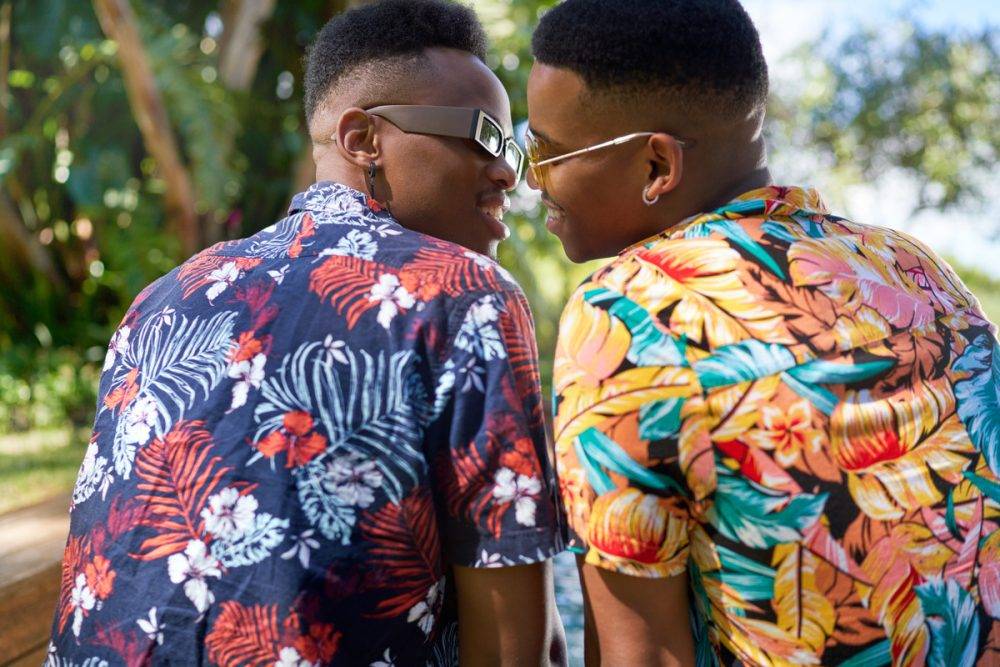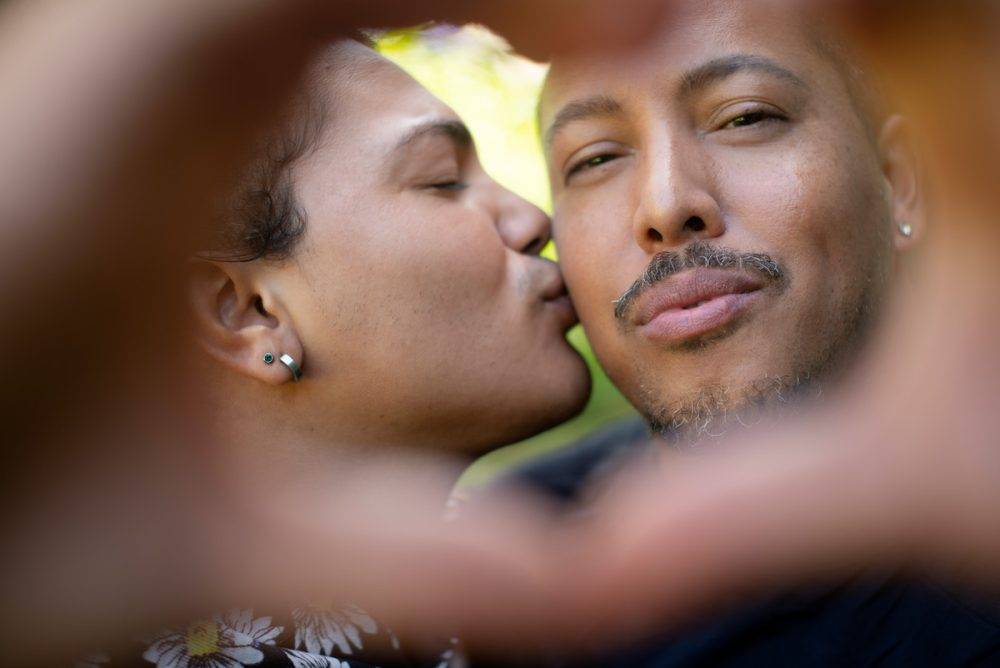Powerful: The short stories in Being Gay is Not All Fabulous, edited by Katlego Vincent Scheepers, explore the trials of black gay men, which include conflicts with conservative Christianity, and the redemptive power of finding sensuality and love. Photos: Pixel Catchers/Getty Images
“I chose not to say this until this point, but this book began as a suicide note at a time when I felt like a total fraud and failure. I couldn’t imagine a future; all I could see was the world closing in on me while shutting me out.”
This quote from Siya Khumalo’s book You Have to be Gay to Know God reflects the poignant and overwhelming internal strife young gay people go through as they try to make sense of their sexuality and seek acceptance in a hostile world.
That being gay induces mental illness and suicidal thoughts, eventually self-annihilation for some, is no small matter.
Contrary to popular images of gay people as “fabulous”, parading glitz and limitless wealth, most are riddled with misery. This internal and very real fear emanates from society’s attitudes towards same-sex sexuality. Repercussions range from stigma to rejection, brutal physical assault and even death.
It is often about endurance. Being Gay is Not All Fabulous: Short Stories of Black South African Gay Men is a testament to such survival. Katlego Vincent Scheepers, the volume’s editor, assembled seven young, black, gay men to tell their stories of resilience and the challenge of everyday living.
The writers plot narratives that traverse childhood, family, church and school. The complexity of teenage years and the discovery of sexuality are centred too.
Ironically, “discovery of sexuality” coincides with the period when most of the contributors hide their true selves as gay people. Some begin to have girlfriends, while others immerse themselves in academic work or extra-curricular activities.

This comes at immense emotional cost as each young man grows up with the fear of being discovered. Thus, patriarchy, trans- and homophobia, whether subtle or not, become the “fear factory” whose machinations induce trauma in their lives — permanently for most.
Eventually, the contributors express yearning for freedom. Ideation of a utopian world surfaces. This illusory redemption necessitates a relocation to Pretoria or Joburg. City life implies a like-minded community for solace, and a shield from the glaring communal stares, gossiping family and close acquaintances back home.
In examining the plots in these stories, the city somehow affords most the maturity and self-acceptance they wish for. Others are exposed to networks of healing comprising solid emotional bonds with new lovers or close friends.
Fundamentally, Scheepers seeks to dispel homophobia. Also, his choice of a conversational tone that is transparent and accessible speaks to those at the grassroots, with no protection by the myth of “fabulosity”.
Scheepers implicitly brings to scrutiny the myth of same sex-relations being Western, centred around middle-class consumerism and often read as white-influenced. In fact, white men have their challenges too — this is not what I am invoking here, but rather speaking to dominant tropes that affect us all as the LGBTQI+ community, even if class and race dynamics enter the equation.
While penned from different positions and individual experiences, there are common themes that stitch these stories together.
Heteronormativity underscored by bullying is pervasive. Scheepers reveals how this leads to an “identity as being a person out-of-place”. This alienation afflicts most members of the queer community. Being called names such as “i-stabane” and “sempatleng basimaneng” (do not look for me among the boys), “spharela banyana” (a boy who always sits with girls) forms part of the bullying culture at school.
Another trope is that of being a “real (African) man” (my emphasis). Its basis is informed by male machismo that prescribes a specific mindset and the display of related behavioural attributes.
As a disguise, young gay men “perform” heterosexuality: court girls, or play sports to prove their “strength”. Some, like Tshepo Maake in this volume, attended initiation school. Being unflinching in the face of pain through the initiation process certifies one a “man”.
In a quest to “fix” him, Xola Dladla Nkosi recounts how his life orientation teacher told him to refrain from playing with girls and stick with boys.
This book is not full of sob stories. Notably, the resistance of these young men stands in stark contrast to the hardships they encounter. Those who excel in sports, the arts and academics sometimes even get recognition that accords them hero/star status at school.
Excellence academically and in extracurricular activities cultivates a positive work ethic that becomes a lifelong skill. The motivation is debatable, no doubt, but the fruit is sweeter.

The contributors reflect on the support they received from families, especially their mothers. When coming out, some receive affirmations such as, “I knew all along.”
Lerato Mofokeng’s story pays tribute to his mother and her support in a pleasant and encouraging way. Through the prism of his mother’s affirmation, he also recounts a tragic event — her death in an accident.
Poignantly, he tells how a part of him died with her. Yet he forges on, wanting his mother to be proud and wishing to go on to have children of his own — a boy and a girl.
This aspiration remarkably validates the ordinariness and the humanity of the LGBTQI+ community, which faces untold stigmatisation as being aberrant.
Eroticism, rendered in the most sensitive way, reveals its various layers, suffused with the complexities of both hetero and same-gender attraction. From the outset, it is used as a veil to hide one’s orientation; an antidote to recalibrate one’s sexuality to straightness.
Still, there is also the homoerotic fantasy and heightened sensuality that comes with the discovery and bodily experience of male-to-male sex. This dizzying encounter does not fully escape the traps presented by heterosexual notions of male/female, dominant/subjugated.
Ideas of top/bottom (masculine/feminine) often rear their heads in problematic ways. Nonetheless, some of the contributors negotiate their way through this maze until they find comfort with the ones they love.
For some, issues around HIV/Aids and sexual wellness permeate their sexual encounters. This is often compounded by the lack of proper sex education for gay men.
Curiously, Olebogeng Seripe’s journey into eroticism came through porn videos, hidden deep in the files of his phone. As a paradox, the two levels of secrecy — hiding attraction to other boys, while indulging privately in gay porn — collide awkwardly. Yet the latter secret and fear was liberating as it sharpened his resolve to love men fully.
South Africa is a deeply religious society. In his book, Khumalo states that religion makes outcasts of gay people, including those who promote salvation and God’s grace for the LGBTQI+ community.
The subtext seems to suggest that acceptance is guaranteed if, through salvation, you decimate your desire for the same sex: “Be gay as long as you renounce intimacy.”
It is no secret that institutionalised religion is a purveyor of hypocrisy and hate, often making one sin more severe than another.
In a dejected tone, Seripe narrates the fallout with his mother. A festering wound that has not healed, despite moving on in life.
He tells us:“A few months later, I decided to come out to my mother who throughout my childhood was very supportive and understanding.
“Instead of being a joyful conversation with my mother, it became a distasteful exchange of words that turned us into enemies. Our relationship went from being good to being sour over the course of a second …
“Religion has been one of the structures that has rejected me because I don’t fit the script.”
Brilliantly, Scheepers adds an “endnote” to the book titled Letters to our Younger Selves. I warmed to this section as it restores healing. All writers reflect on their strengths. The book closes with a sense of restoration, serenity and wisdom, despite extremely traumatic experiences.
The stories present invigorating dialogue that vicariously draws the reader in. I saw my young self in these stories. Undoubtedly, most readers will be mirrored too and curtail the endemic spiritual and mental turmoil in which most queer people find themselves trapped.
I highly recommend this book, including to the kind of life orientation teacher who tries to “cure” the queer students in their classes when they should be a refuge for the vulnerable.
• Thembela Vokwana is a senior lecturer in the department of music at the University of Fort Hare.
• Being Gay is Not All Fabulous: Short Stories of Black South African Gay Men is published by Hoopoe Press/UJ Press.